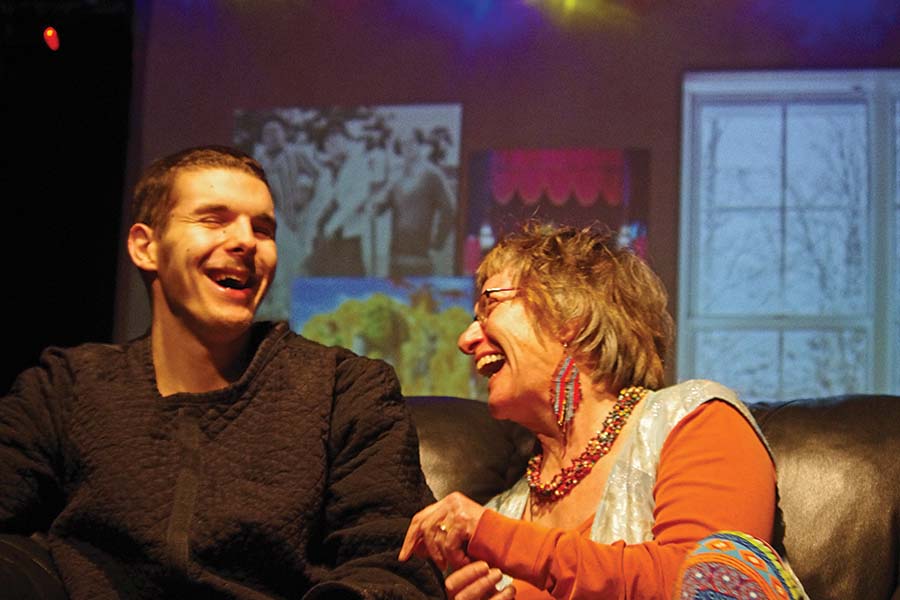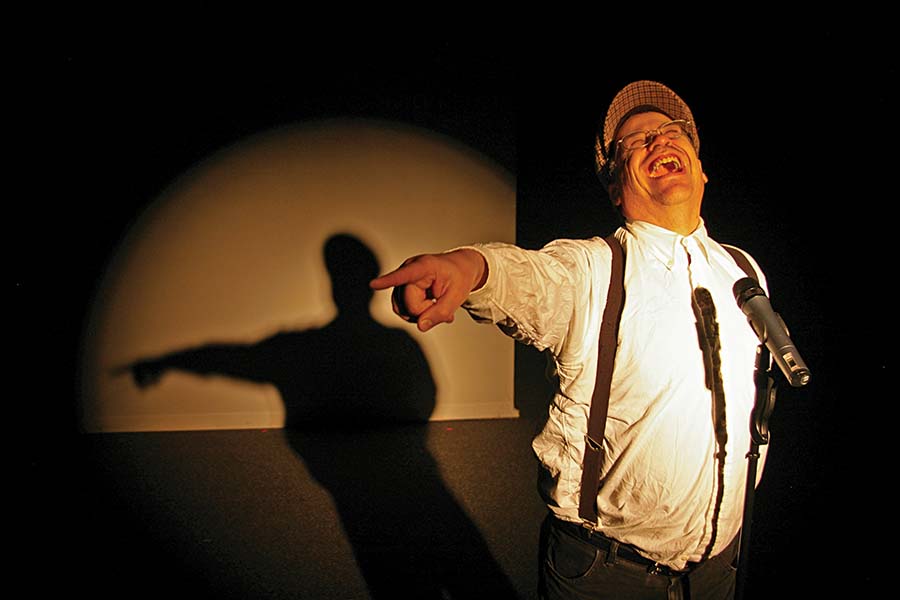CHALLENGE
To present more authentic representations of individuals with disabilities onstage
PLAN
To help individuals with disabilities devise original work with their own lives as inspiration
WHAT WORKED
Creating original work and presenting it across the state of Wisconsin
WHAT NEEDS WORK
The typical strenuous rehearsal process; sticking to a set script
KelsyAnne Schoenhaar was once asked to consult for a theatre troupe for actors with disabilities. She visited them, observed their process, and was not impressed with what she saw. “I felt like it was disappointing and sad,” Schoenhaar recalls. “It looked like a kindergarten performance. The director stood in front and mouthed the words.”
The problem wasn’t the performers, she says—it was that they had been treated like children, taught to parrot scripted lines, rather than as adults with authentic stories. That inspired Schoenhaar to found her own theatre company in 2000: Encore Studio for the Performing Arts, based in Madison, Wisc., which allows performers with disabilities to devise and perform original work.
“I have two daughters on the spectrum and I’m on the spectrum myself,” Schoenhaar explains. “You can be super, super academically gifted and not have incredible vocal skills, but there is always a skill to grab from.” She also wanted to give performers with disabilities the space and encouragement to tell their own stories. “There is always a story,” she says. “We’ve been doing it for 17 years and we haven’t run out.”
Schoenhaar founded Encore with the desire to create work in collaboration with performers with disabilities, who are notoriously underrepresented onstage, and to give those individuals an outlet for performance that focused less on making it “special,” she says. “It’s not uncommon for theatres, especially when there are people with developmental disabilities, to make it more special than real. That’s a disservice for everyone. Our community only learns by getting the information and holding a mirror up to what is happening.”
Since its founding, Encore has produced more than 40 original pieces and performed them across Wisconsin. It currently boasts a company of 18 actors, and its staff numbers 7.
From the beginning, the pieces have largely been written after Schoenhaar sits down with performers and individually interviews them. She then puts those snippets together, documentary theatre-style, into a finished show, usually centered around a common theme, such as the 2016 musical comedy Marriage-Ability, about marriage and relationships for people with disabilities.
Schoenhaar believes producing original work reflecting the disabled community is “where the substance happens.” Encore’s productions are done as a series of vignettes, so the company can include as many voices as possible within one production. “I have found that examining complex lives of an underrepresented community of people in a non-preachy, no-BS style has been very powerful and effective,” she remarks. “Truth is often stranger and more compelling than fiction.”
As such, the company tackles topics that mainstream culture and theatre seldom touch when it comes to portraying disabilities. One play, To Love or Not to Love, shows people with disabilities in loving relationships, getting in touch with their sexuality, and, in one painful moment, experiencing abuse.

Through support, Encore has made it possible for some performers to overcome behavioral challenges. Jennifer Kopp, a founding repertory member of Encore, is one such person. Kopp has both cognitive and developmental disabilities as well as issues in the area of emotional control.
“Jenny is completely different from when we first met,” Schoenhaar says. Kopp describes her own previous behavior as “wild.”
One piece from Encore’s repertoire was inspired by Kopp. In the vignette “All She Thinks About Is Sex,” part of To Love or Not to Love, Kopp’s character laments, in a bluesy musical number, her confusion about why she’s being sent to court. Her character is in trouble for inappropriate sexual conduct, but doesn’t understand why it was inappropriate.
In real life, Kopp was nearly 30 when she was in high school, where she wanted to interact with her peers, in particular young men. That’s when someone might need support if they struggle with emotional control or decision making, Schoenhaar explains.
“[The vignette] addressed a lot of issues,” Schoenhaar says. “It’s a predatory behavior in action, but it’s not as insidious as it might seem on the surface.”
Now living a healthy, caffeine-free lifestyle, Kopp is much better equipped to work with her fellow actors and achieve her dream of performing.
“[Theatres like Encore] could really help people with disabilities,” Kopp says. “If they’ve never been in a theatre like Encore and they’re nervous, they could come to a show and see all of us here with different disabilities and see we aren’t scared or nervous to do a show about our lives.”
And it’s not just onstage: Encore also employs artists with disabilities as part of the running crew, tech, and design crews as well.
When working with performers with different disabilities, Schoenhaar stresses the importance of flexibility—whether it’s adapting scripts, or altering rehearsal or anything in between, to make sure the performers feel comfortable and can do the best work onstage.
One such challenge involves the actual text. If a performer is struggling with a line due to a speech impediment or other barriers, it is adapted to their needs. But that’s one perk of doing original work. “The adaptation is almost the genius of working with such a vast array of people with different abilities,” says Schoenhaar. “You aren’t just saying, ‘You must do this because I’m the director.’ We do whatever we need to do.”
Encore’s “no-BS style” can mean that the intensity of the topics can be particularly difficult for actors who have trouble controlling their emotions. In those cases, staff must be ready to quickly switch gears to support performers. If actors are uncomfortable or having a hard time, it’s usually time to slow down.
“We all have hard days,” Schoenhaar notes. “Some people take a short break, others listen to music to chill out. If I find things are out of control, we often just call for a general break for all as to not focus on any one actor.”
That’s why Schoenhaar also suggests that directors be prepared for longer rehearsals, “as there may be a need to adjust to learning styles and other support needs,” she says.
Adjusting rehearsals has become less of a necessity for Encore, however, as their acting company has gained more and more experience. This is all the more striking given that many Encore performers are not formally trained. Robin Parks is a former caregiver with a condition so rare that no one has ever heard of it before. She even goes to the University of Wisconsin-Madison to talk to students on their first day of medical school about her condition, currently explained as a form of cerebral palsy.
Encore presented a monologue version of Parks’s story as part of the 2015 Encore play Not Always a Parent, about raising a child with a disability. It was both an emotional and fun piece to perform, says Parks, and, most importantly, it did not take a patronizing attitude to its subject. “I hate it when people call me ‘sweetie’ and all of that. It’s condescending. I’ve told more than one person my name is Robin, not sweetie.”
Parks believes that, perhaps, other companies are afraid to tell real stories about the disabled community for fear the person they are basing the piece on will be offended. But she has never felt that way and enjoys telling people about her life. She even surprises people when she tells them she’s an actor. “My dream job would’ve been to combine guidance counseling and acting,” she says. “Those give me the most confidence.”
For many of Encore’s performers, telling their own stories onstage is a way of reclaiming the narrative of what the disabled experience can look like: full and vibrant, not tragic. There is one show remaining for Encore’s 2017-18 season, Road Trip, in May. The company has not yet announced their new season lineup, but rest assured it will continue to center the disabled experience, in all of its complexities.
“You only have one short life,” Kopp muses. “It makes me feel happy to be here and do shows. I can tell the audience about me and I feel good inside telling people about my life.”
Amanda Finn is an arts and lifestyle reporter at the Wisconsin State Journal in Madison, Wisc., and a member of the American Theatre Critics Association.


